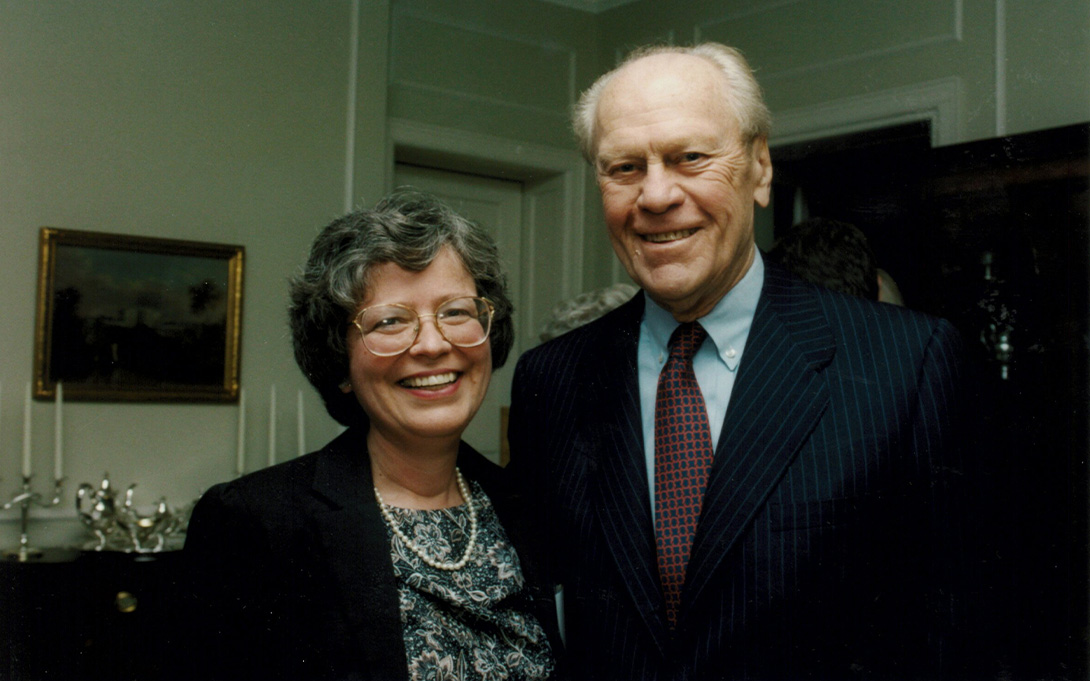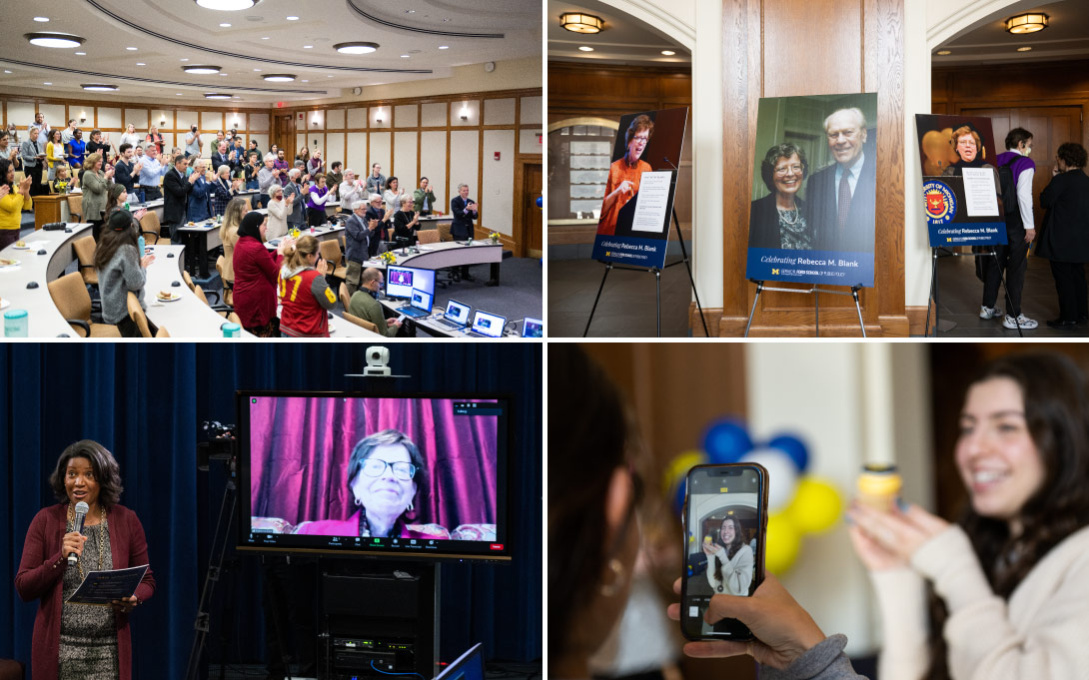
“Becky Blank put the Ford School on the map, literally. We – all of us who learn and teach and work here, and our alumni who are out there making communities better – WE are the house that Becky built.”
So began Ford School interim dean Celeste Watkins-Hayes in her tribute to Rebecca Blank, Ford School dean 1999-2007, on November 1. During Blank’s tenure, the school was officially named after President Gerald R. Ford, and the school’s home, Weill Hall, at the corner of State and Hill Streets, was constructed.
The school expanded academically as well, with outstanding undergraduate and doctoral programs established, making the Ford School a “full service” school of public policy.
In honor of her service and accomplishments, the main gathering space at Weill Hall was named the Rebecca M. Blank Great Hall.
Luke Shaefer, associate dean for research and policy engagement, interviewed Blank about her career spanning the Clinton and Obama administrations, as well as her tenure at the Ford School and then as University of Wisconsin-Madison Chancellor. He told the 200 people gathered physically and many more online attendees that the school hopes for the newly-named Great Hall to be known as "the Becky."

"It beats Blank Hall," Blank agreed. "Don’t call it that!"
Asked how she was tempted to take the job as dean, which she initially didn’t want, she told a story about writing a list to then-U-M Provost Nancy Cantor of 10 things the University needed to do to create a professional school on the same level as other units on campus. “I sent that off and said, ‘Fine, I’m done with this.’”
To her surprise the next day Cantor called her into her office and told her, “You're absolutely right. We've costed out everything in this letter … We're putting it into your budget and we want you here by the first of August!”
Professor John Chamberlin noted that the school has graduated 14 BA classes. It took years of preparation for the program to launch. Blank commented, “When people ask me about leadership, I use [the BA program] as an example of the importance of persistence when you have something that you think really needs to get done. It took eight years to do this. The program opened the year after I left and I worked on it for that entire set of seven years. And I kept being told no by a variety of people in the administration.
“And I just say, I have to thank John and everyone who worked on that for that entire period of time. But if you hadn't been persistent despite being told no, because it was the right thing to do, the right thing for the Ford School, given you're at a university where the biggest program is undergraduate, you wanna be part of that. And Michigan has great undergraduate students, so that was a real victory. And I've been delighted to watch that program grow and thrive and provide a great education to so many students.”
Shaefer called the PhD program “like nothing else in the field. Combining policy training with disciplinary studies and economics, political science or sociology, it's been a huge success.”
“We didn't want a standalone PhD program,” she said. “We wanted an integrated PhD program with the first rate social science programs that the University of Michigan already had on board … The result was this program [with] students who when they go out, are gonna get a letter saying, this is as good an economist as anyone else graduating this year. But they even have more, they have all this additional training on policy issues and that gives them a leg up on everyone else.”
Professor Paul Courant described the origins of the Ford School’s culture of collegiality and excellence—a culture that Blank carried on from the Institute of Public Policy Studies (IPPS) era, through a name change and a period of great growth.
Faculty with tenure from elsewhere across campus chose to sit and work at IPPS, Courant recalled, because “IPPS gave you more. There was this notion that coming to the office, coming to IPPS should be fun. There was this sense of we are all part of something that is made up of different pieces that look somewhat different from each other. That's a very good theme for both public policy and public affairs generally. We're gonna do that everywhere you turn. And so people who used to be called IPPSters, they've now transitioned. No one's an IPPSter anymore, they're Fordies.”
Blank spoke of her admiration of President Ford, whom she got to know. Though she had disagreed with his decision to pardon Richard Nixon, over time, she said, she realized Ford's decision was the right one, the "only way to bring the country together and move forward," even though it cost him on Election Day in 1976.
"I wish we had a few more politicians like that right now around Washington, D.C.," she said.
On naming the school, she said, “I don't think anyone will ever not be proud of the Ford School name. It's far better than being named for a donor, to be blunt. You never know what's gonna come out of someone's background. President Ford's background was pretty much a public book. And there's not gonna be any embarrassments coming that way. It's a name to be proud of.”
Reflecting on her policy work in Washington, D.C., she said, "I've three times left academia for temporary government jobs and then come back. Going to D.C. was invaluable to understanding that process, and particularly given there were times I wanted to advocate for certain things. Having been in the D.C. process helped me know how to do that. I always thought my time in DC enriched my research. It gave me a sense of what some key questions were that no one else was thinking about, because they weren't in those conversations. They were off in their academic seminars.”
She added, “Learning how to politically navigate D.C. is not unhelpful when you’re running a university. Everything at some point comes down to a certain amount of political negotiation."
Please consider making a gift that honors Becky Blank's tremendous contributions to the Ford School as dean through the Rebecca M. Blank and Hanns Kuttner Fund for Student Support. Student support defrays costs for undergraduate and graduate fellowships, internships, travel, and professional development, making it possible to select opportunities most relevant to their career goals.


